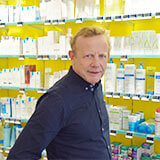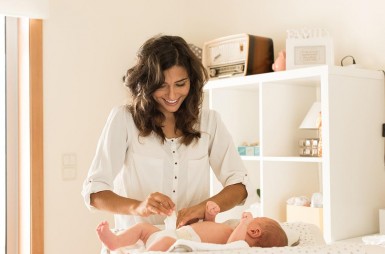Which bath foam, shampoo or shower gel should you choose for your child
Written by Paul Musset, Doctor in Pharmacy | published on | updated on 17/04/2024

If you ask a child to choose their own bath foam, the choice will be quick: it will almost certainly be the one in a bottle in the shape of their favourite super hero or bubble gum flavour. However, before giving in to their wishes, it is important to be aware that children’s shower and other hygiene products need to be chosen with care. Their skin is often fragile so gentle products need to be used. Here is our advice on how to choose shower gels and shampoo for your children.
Child Hygiene: what needs to be thought about when choosing?
Composition: which ingredients to avoid?
When choosing hygiene products for children, it is important to focus on their composition and the list of ingredients they contain.
• SLS
Ingredients such as Sodium Lauryl Sulphate, also known as SLS, form part of the list of products to avoid. These are surfactants used to make the shower gel or shampoo foam. Problem the two active molecules in the detergent agent can irritate the skin, the mucous lining and the eyes. If these products containing SLS are used too often, they can damage the skin and its protective layer. In children it can be responsible for itchiness, redness or irritation and even allergies. Ideally one should choose products containing natural surfactants, coconut oil for example (Coco-glucoside or lauryl glucoside). The foam effect is the same!
• Parabens
Although they are tending to disappear in cosmetics, parabens are often still found in body care products. These preservatives (known under different names ending with –parabens) are a notorious cause of allergies. It is also suspected that they are endocrine disruptors and carcinogenic.
• Perfumes and essential oils
Although not dangerous in themselves, perfumes (therefore alcohol) should be prohibited in products for children, as well as essential oils which are used to aromatise products for the body. Perfumes (such as limonene) are in fact allergenic substances which could cause allergies. Essential Oils are essentially very powerful products which are not appropriate for their young age.
Practicalities: Format, scent, etc.
When looking at products for children, the practical side of things should not be ignored. One should turn to a shampoo or shower gel that they will like, that is easy to use and handle. On the scent side, go for a neutral smell or something sugary (fruits for example). Baby products are generally fairly discrete and do not contain synthetic scents or alcohol.
Bath foam and shower gel for children
Shower Gel or bath foam: what is the difference?
Shower gel for children and bath foam for children are basically used for the same thing: to wash the body! But bath foam, because of its make-up has the tendency to make more foam, and therefore is used in the bath to keep children amused. Shower gel foams less. For the very little ones, without much hair, shower gel or bath foam is both generally effective for hair washing. They can both be used for the body as well as the scalp. These two bath products for children are practical to use due to their liquid format : one single press is enough to wash the body of a small child or baby.
How to decide which shower gel to choose for children?
Here again, a product made without harsh or allergenic ingredients is preferable, one which nourishes the skin and does not make the eyes sting. Ideally one would choose a formula without soap which will protect the skin, in particular from dryness. For children and babies with sensitive skin or which is subject to irritation (eczema, etc.) it is a good idea to choose a derma-protecting formula rich in oils and nourishment, such as vegetable butters or oils. Shower milks, very soft and enriched with emollients, are, for example, perfect for fragile or dry skin, cleaning softly whilst hydrating.
Can soap be used on children?
It is perfectly possible to use a bar of soap (solid soap) to wash children and babies. However, it is more difficult to handle than shower gel for some little ones, especially when they start to wash themselves. The most important is to choose a soft soap made from natural ingredients.
Shampoo for children
How to decide which shampoo to choose for children?
First of all, make sure to check the intended age range for the use of shampoo for children: some are not recommended for babies or under three year olds. Here you can choose a classic formula, or even a skin calming children’s shampoo, ideal for an irritated or sensitive scalp. If your child has long hair a special anti-tangle shampoo would be useful: it will help to straighten the hair and untangle it in the shower. You could equally use an untangling agent, such as a post wash conditioner or a spray used before washing to get rid of the knots.
Focus on Head lice shampoos
There is another category made for children as well as for their parents: Head Lice shampoo! Used to treat the condition, they should be applied in line with the instructions on the packaging. Some shampoos or lotions can be used from 6 months and work using a natural agent which blocks the respiratory passages of the head lice and nits. Ideally these should be used in conjunction with a head lice comb to unstick the nits, followed by a repellent spray to prevent a reoccurrence.
From amongst the vast choice of body and hair washing products for your children available in multiple flavours and coloured packaging, you should now be able to see a little more clearly. In brief, the key is softness and non-allergenic ingredients. For travelling, solid products are also preferable whilst still choosing a healthy composition.
The three key points to remember in relation to children’s hygiene:
- Avoid SLS, parabens and perfume ingredients;
- Choose a shower gel without soap with derma protection for irritated skin;
- Use conditioner after shampooing to avoid knots.


























